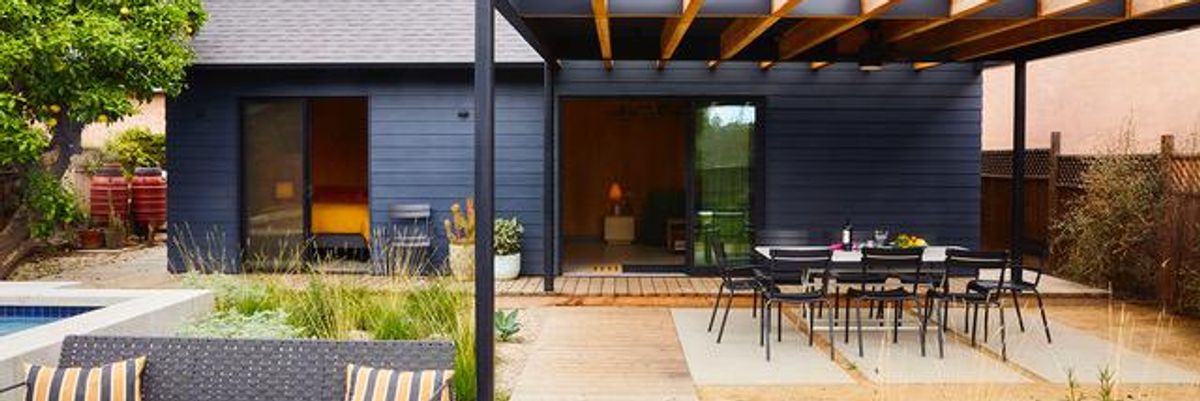

Get in the KNOW
on LA Startups & Tech
X
Design, Bitches
Looking to Build a Granny Flat in Your Backyard? Meet the Firms and Designs Pre-Approved in LA
Sarah Favot
Favot is an award-winning journalist and adjunct instructor at USC's Annenberg School for Communication and Journalism. She previously was an investigative and data reporter at national education news site The 74 and local news site LA School Report. She's also worked at the Los Angeles Daily News. She was a Livingston Award finalist in 2011 and holds a Master's degree in journalism from Boston University and BA from the University of Windsor in Ontario, Canada.
Adding a backyard home in Los Angeles is now nearly as easy as buying a barbecue.
Homeowners who for years have wanted to build a granny flat in their backyard, but dreaded the red tape, can now choose from 20 pre-designed homes that the city has already approved for use.
The shift, made official last week, will speed up a weeks-long process and bring more badly needed units to an overpriced market. It also has the potential to elevate the 14 startups and firms building the next generation of homes.
The designs for the stand-alone residences range from a 200-square-foot studio to a 1,200-square foot, two-story, two-bedroom unit. And many of the homes are filled with design flourishes, reflecting the diverse architecture of the city, from a house in the silhouette of a flower to one with a spiral outdoor staircase leading to the roof.
It's no surprise. The program was spearheaded by Christopher Hawthorne, a former architecture critic at the Los Angeles Times and now the city's chief design officer.
The firms are primarily local and startup architecture and design firms, while others are well-known with a history of building granny flats, also know as accessory dwelling units, or ADUs.
The standard plans avoid the Los Angeles Department of Building and Safety's typical four-to six-week review process and can allow approvals to be completed in as quickly as one day.
Some aspects of the plans can be modified to fit a homeowner's preferences. Eight other designs are pending approval.
Mayor Eric Garcetti believes by adding more such units, the city can diversify its housing supply and tackle the housing crisis. Recent state legislation made it easier to build the small homes on the lot of single-family residences. Since then, ADUs have made up nearly a quarter of Los Angeles' newly permitted housing units.
Because construction costs are relatively low for the granny flats – the pre-approved homes start at $144,000 and can go beyond $300,000 – the housing is generally more affordable. The median home price in L.A. County in January was $690,000.
Here's a quick look at the designs approved so far:
Abodu
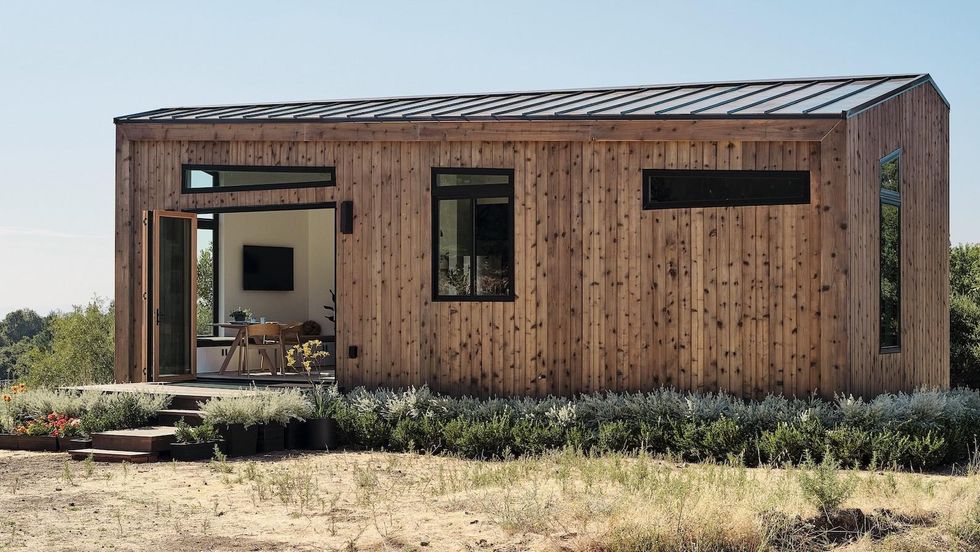
Abodu
Abodu, based in Redwood City in the Bay Area, exclusively designs backyard homes. In 2019, it worked with the city of San Jose on a program similar to the one Los Angeles is undertaking.
In October, it closed a seed funding round of $3.5 million led by Initialized Capital.
It has been approved for a one-story 340-square-foot studio, a one-story one-bedroom at 500 square feet, and a one-story, 610-square-foot two-bedroom.
The pricing for the studio is $189,900, while the one-bedroom costs $199,900 and the two-bedroom is $259,900.
Amunátegui Valdés Architects
Led by Cristobal Amunátegui and Alejandro Valdés, the firm was founded in 2011 and has offices in Los Angeles and Santiago, Chile. Amunátegui is an assistant professor at the Department of Architecture and Urban Design at UCLA.
The firm designs work in various scales and mediums, including buildings, furniture and exhibitions.
Its one-story, two-bedroom with a covered roof deck 934-square-foot unit is pending approval from the city.
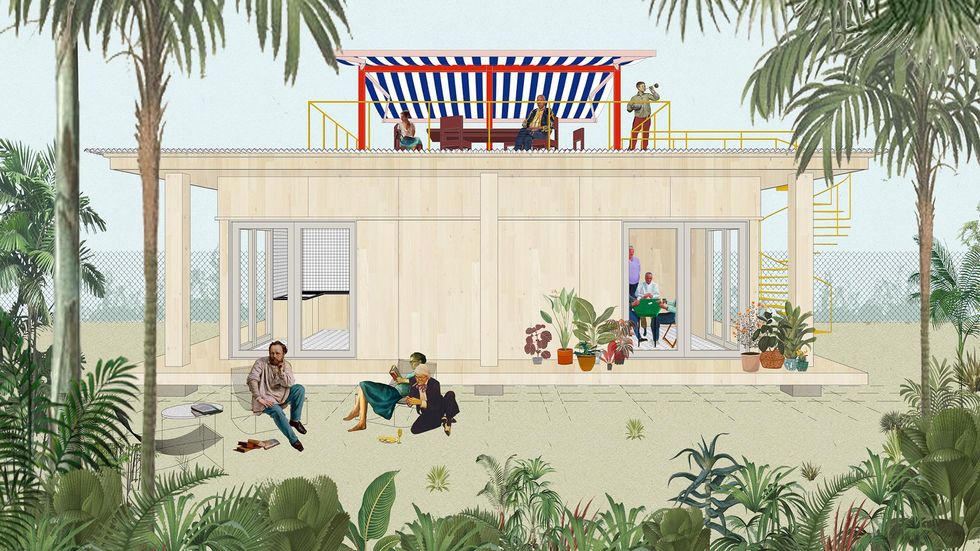
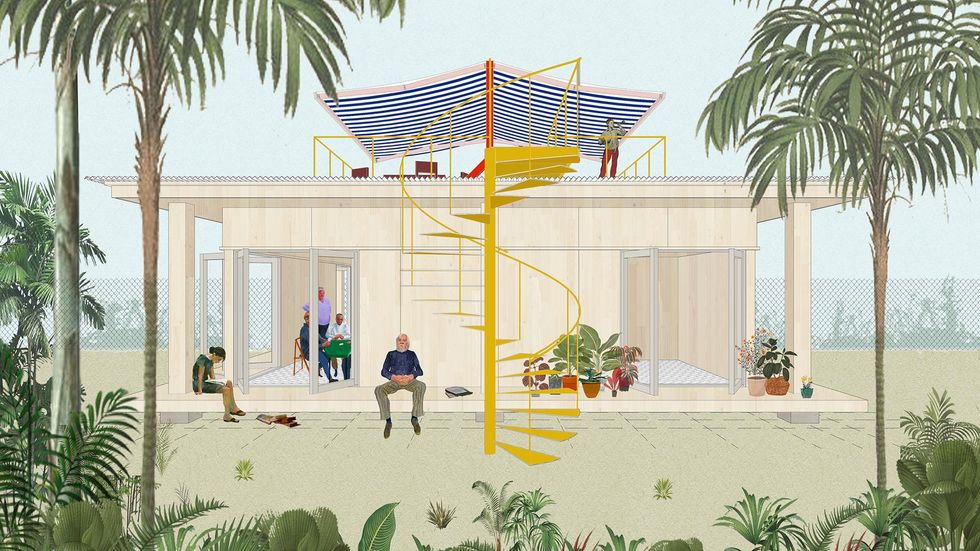
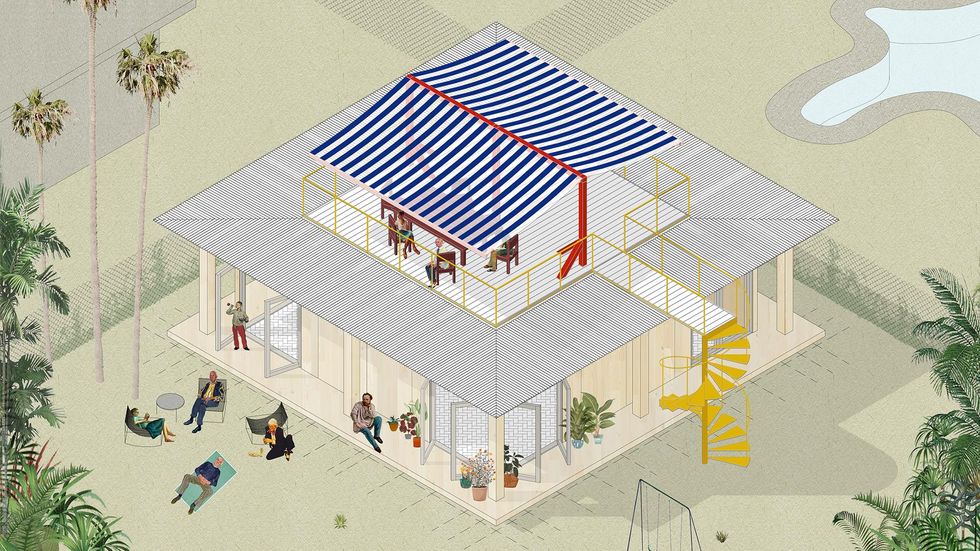
Connect Homes
Connect Homes has a 100,000-square foot factory in San Bernardino and an architecture studio in Downtown L.A.
It specializes in glass and steel homes and has completed 80 homes in California. Its designs have an aesthetic of mid-century modern California residential architecture.
It has two one-bedroom models pre-approved by the city, one is 460 square feet, which costs $144,500 with a total average project cost of $205,000. The other is 640 square feet, which costs $195,200 with a total project cost of $280,000.
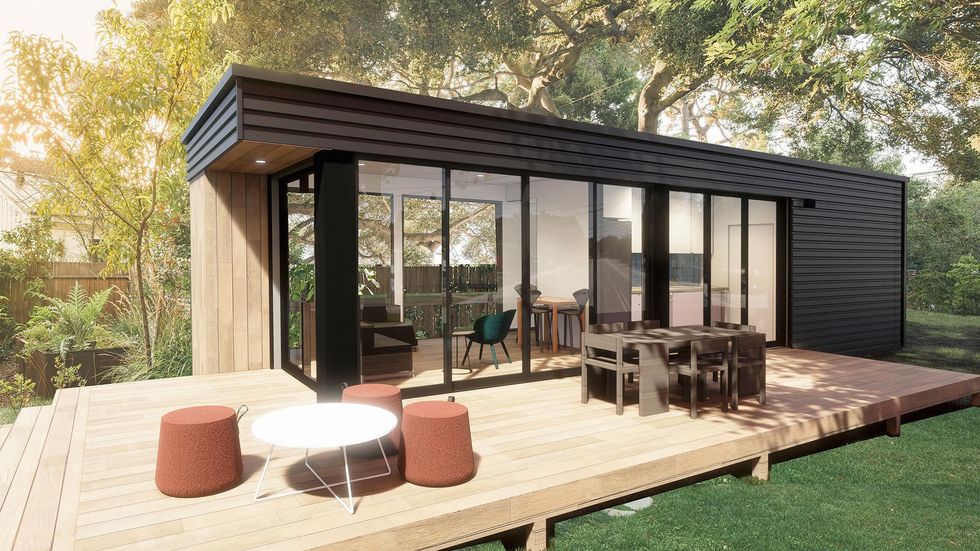
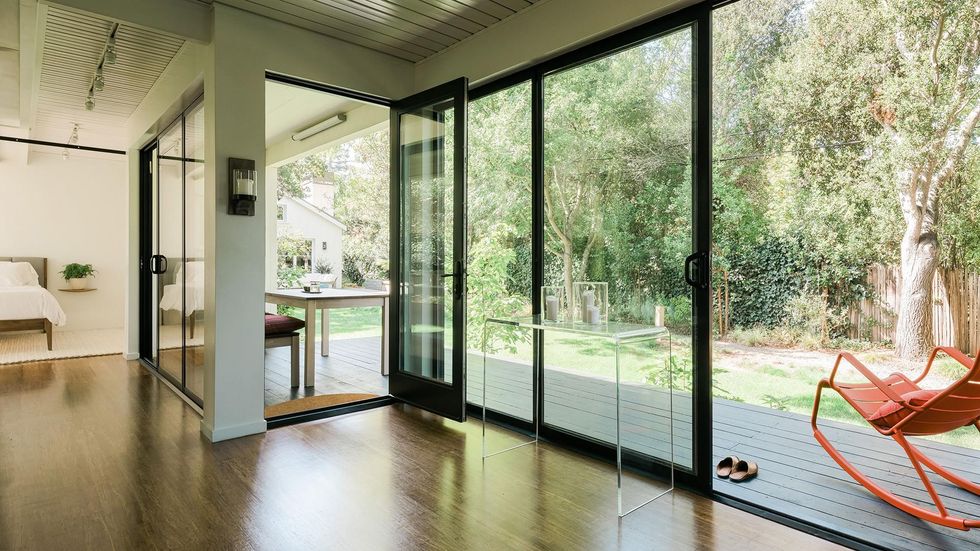
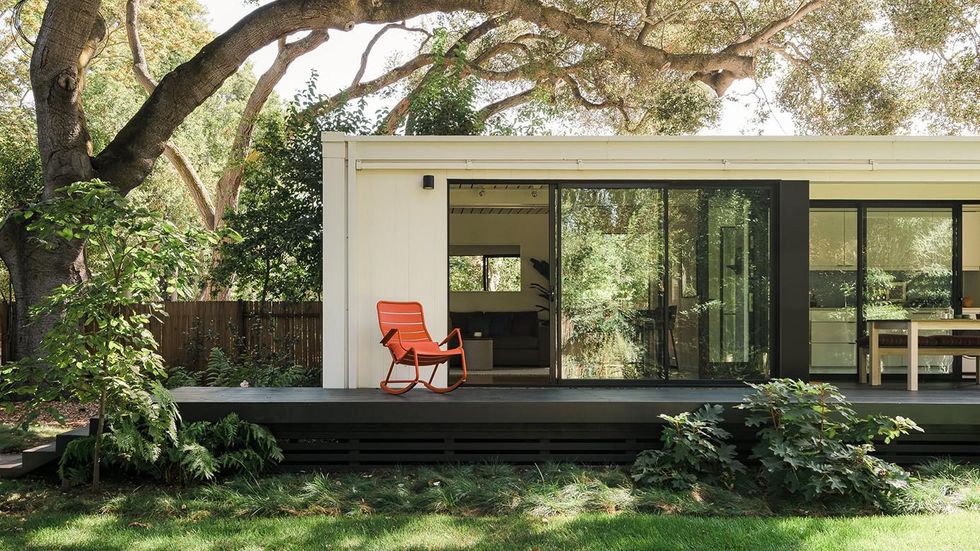
Design, Bitches
The Los Angeles-based architectural firm founded in 2010 describes itself as having a "bold and irreverent vision." Its projects include urban infill ground-up offices to single-family homes, adaptive re-use of derelict commercial buildings and renovations of historic landmarks.
Its pre-approved design, named "Midnight Room," is a guest house/ studio. Its bedroom can be left open for a loft feel or enclosed as a separate room. The design is a one-story, one-bedroom at 454 square feet.
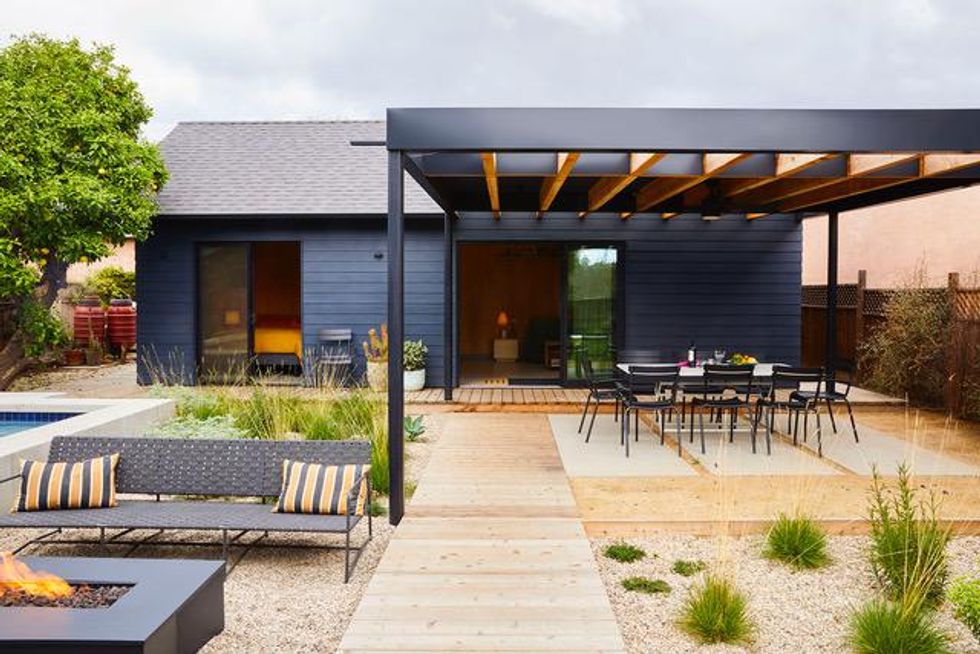
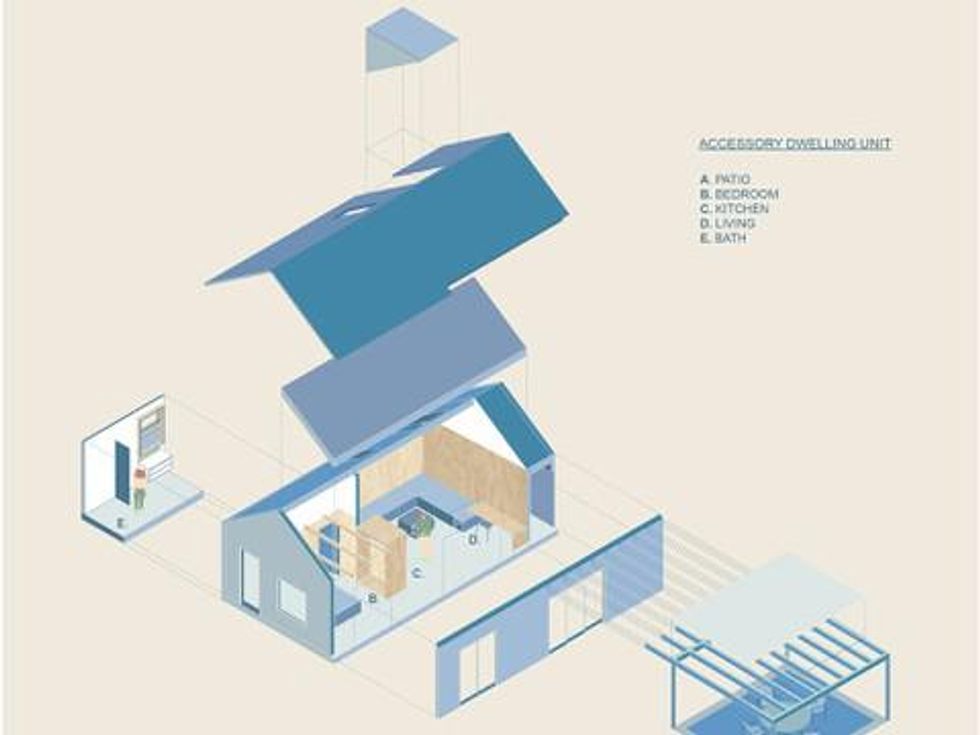
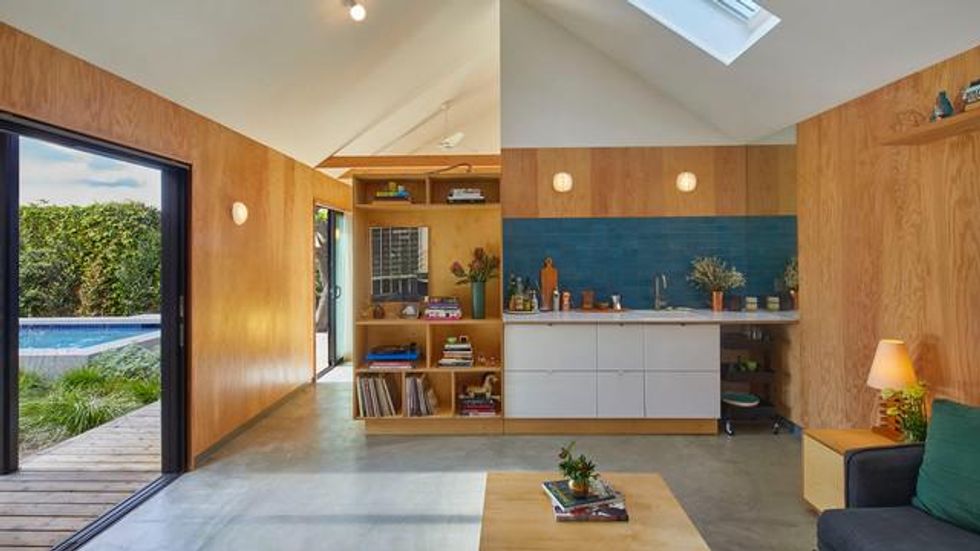
Escher GuneWardena Architecture
Founded in Los Angeles in 1996, Escher GuneWardena Architecture has received international recognition and has collaborated with contemporary artists, worked on historical preservation projects and more.
The company has been approved for two different one-story, one- or two-bedroom units, one at 532 square feet with an estimated cost of $200,000 and another at 784 square feet with an estimated cost of $300,000. The firm noted the costs depend on site conditions and do not include soft costs. Those could add 10% to 12% to the total construction costs.
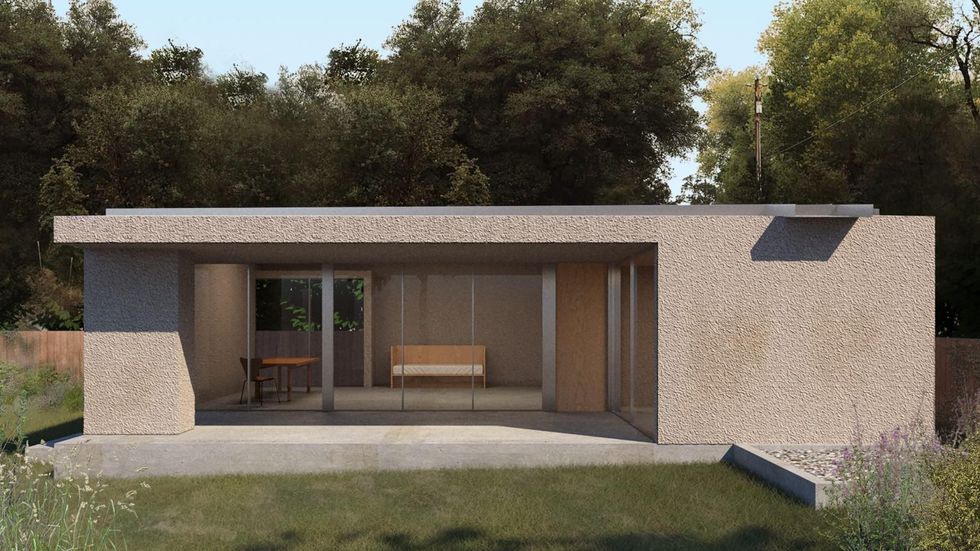
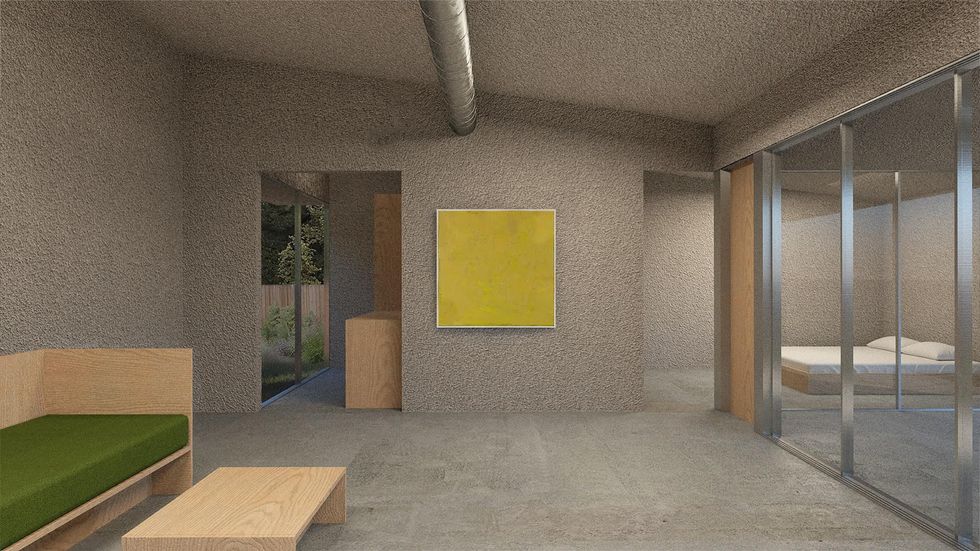
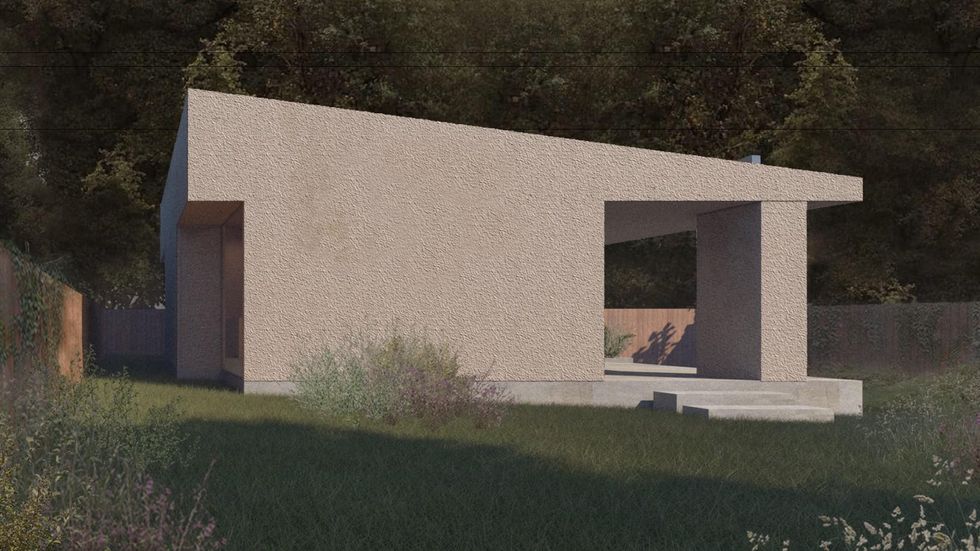
First Office
First Office is an architecture firm based in Downtown Los Angeles. Its approved ADUs will be built using prefabricated structural insulated panels, which allow for expedited construction schedules and high environmental ratings.
The interior finishes include concrete floors, stainless steel counters and an occasional element of conduit.
There are five options:
- A one-story studio, 309 to 589 square feet
- A one-story one-bedroom, 534 to 794 square feet
- And a one-story two-bedroom, 1,200 square feet
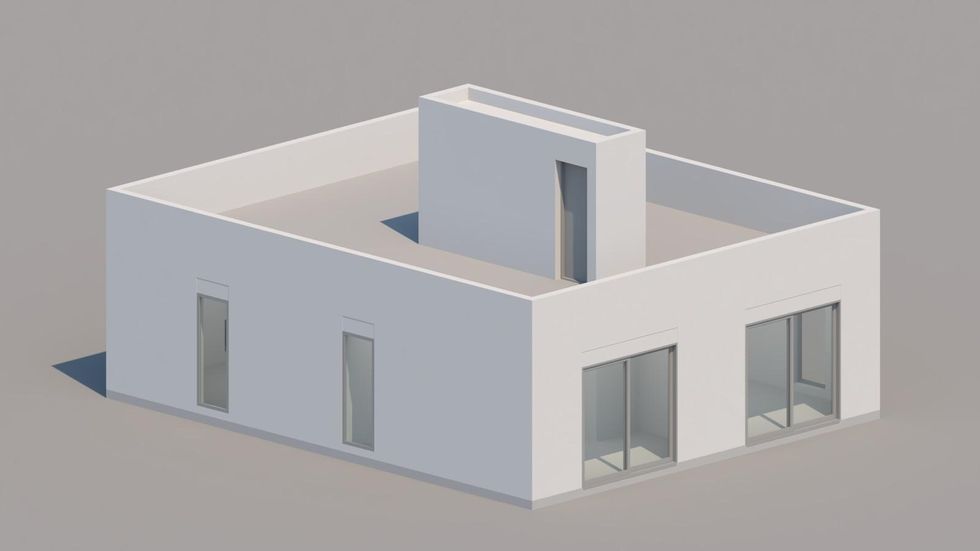
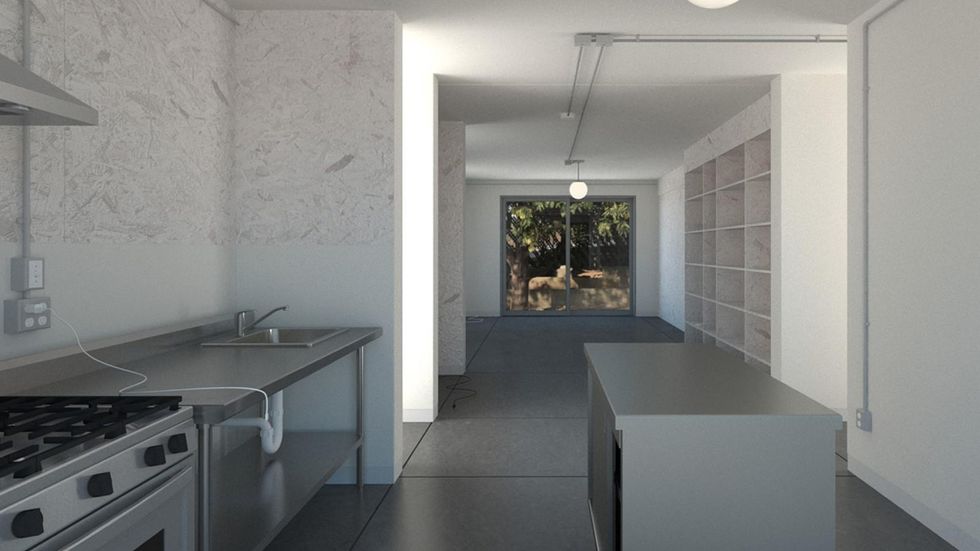
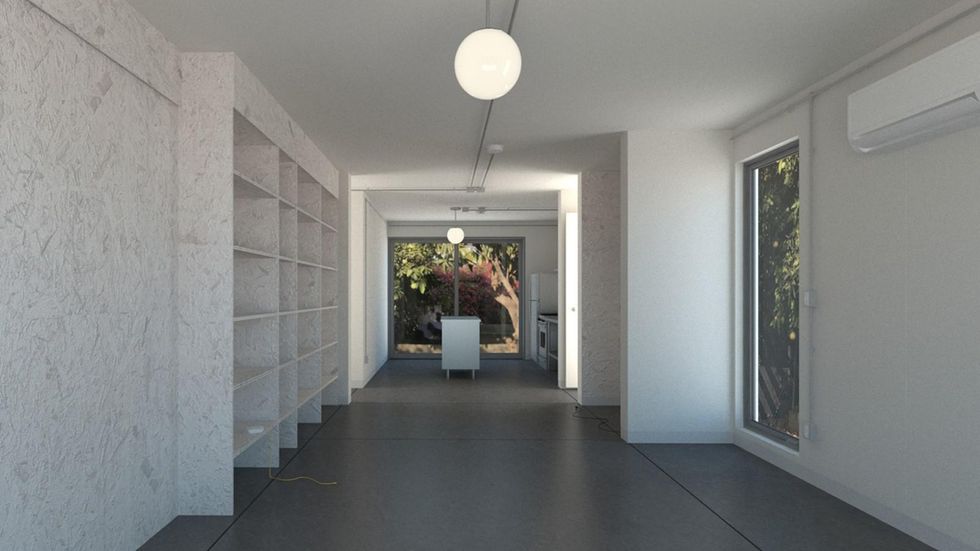
Fung + Blatt Architects
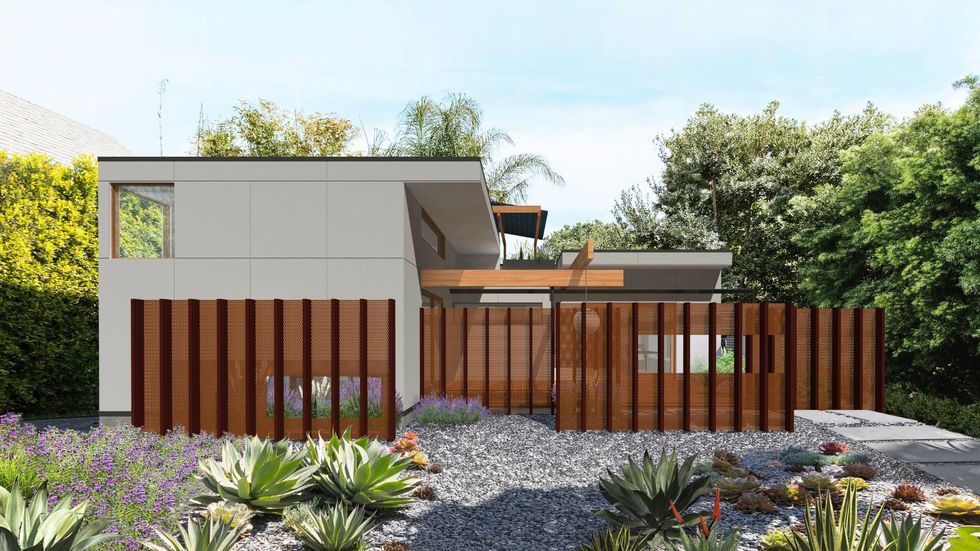
Fung + Blatt Architects is a Los Angeles-based firm founded in 1990.
The city has approved its 795-square-foot, one-story, one-bedroom unit with a roof deck. It estimates the construction cost to be $240,000 to $300,000, excluding landscape, site work and the solar array. Homeowners can also expect other additional costs.
Taalman Architecture/ IT House Inc.
The design team behind "IT House" is Los Angeles-based studio Taalman Architecture. Over the past 15 years, IT House has built more than 20 homes throughout California and the U.S.
The IT House ADU standard plans include the tower, bar, box, cube, pod and court.
The city has approved four options, including:
- A two-story including mechanical room, 660 square feet
- A two-story including mechanical room, 430 square feet
- A one-story studio, 200 square feet
- A one-story including mechanical room, 700 square feet
The firm also has another two projects pending approval: a 360-square-foot one-story studio and a one-story, three-bedroom at 1,149 square feet.

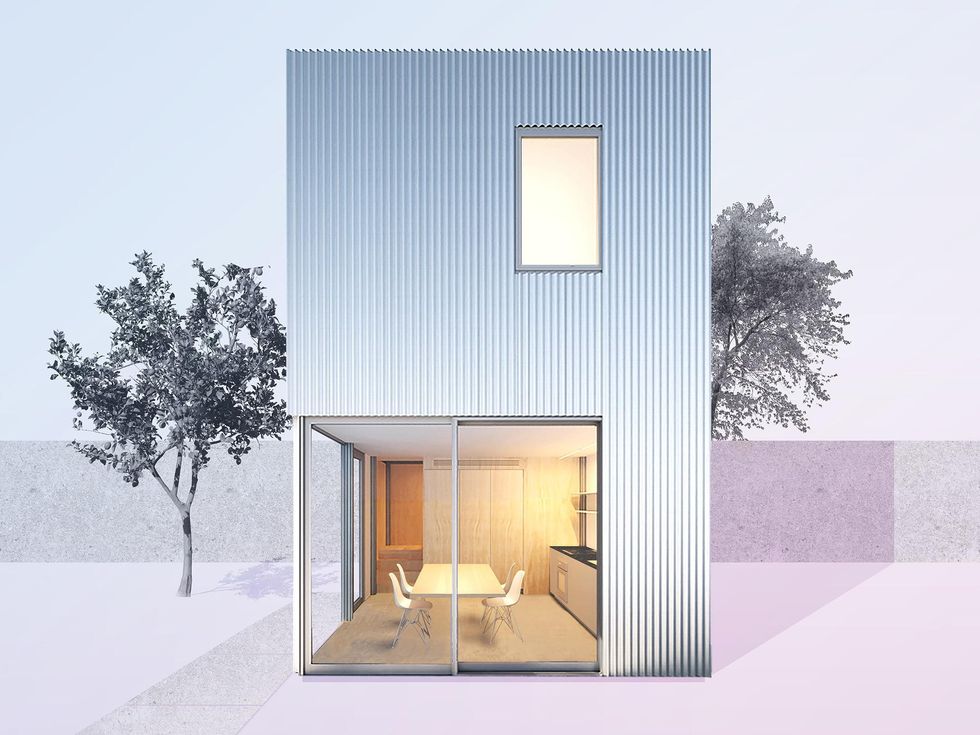
LA Más
LA Más is a nonprofit based in Northeast Los Angeles that designs and builds initiatives promoting neighborhood resilience and elevating the agency of working-class communities of color. Homeowners who are considering their design must commit to renting to Section 8 tenants.
The city has approved two of LA Más' designs: a one-story, one-bedroom, 528 square feet unit and a one-story, two-bedroom, 768 square feet unit. The firm has another design for a one-story studio pending approval. That design would be the first 3D-printed ADU design in the city's program.
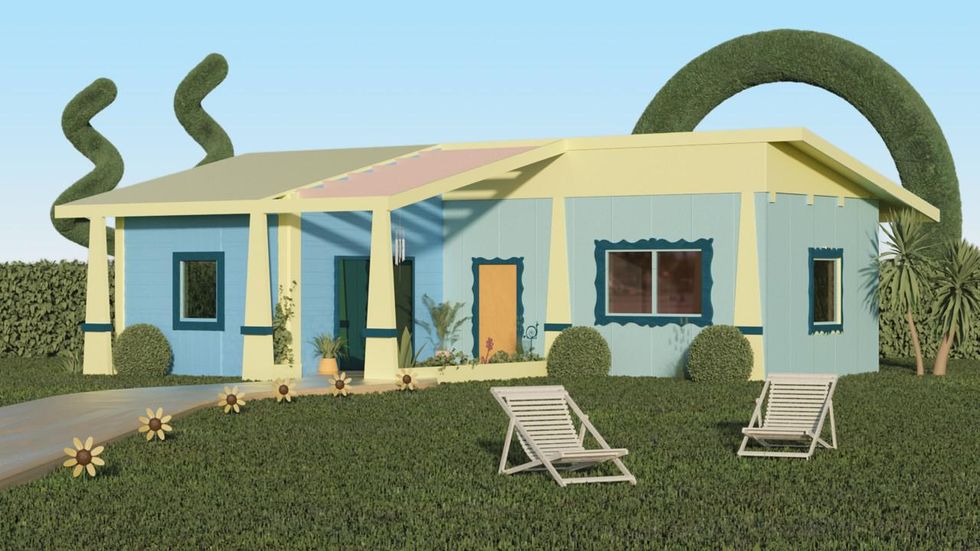
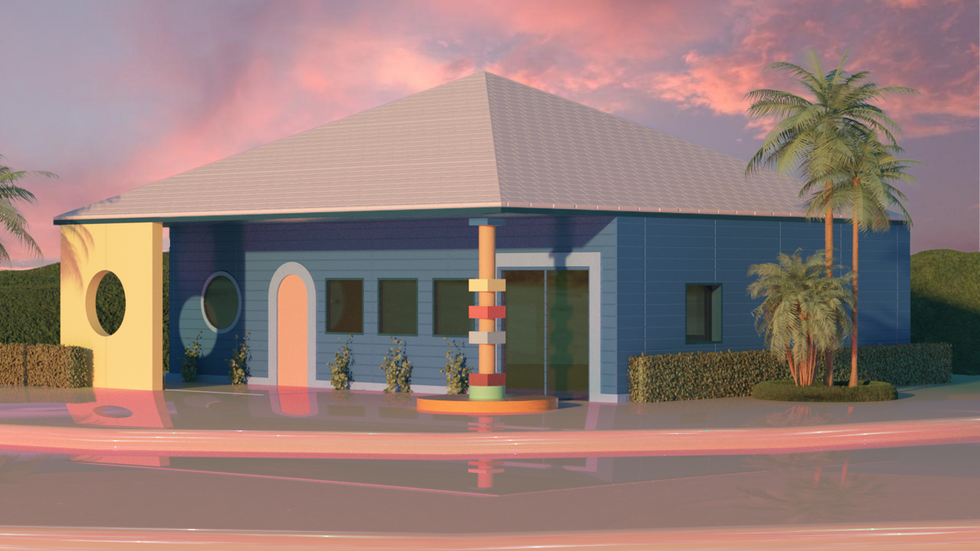

Jennifer Bonner/MALL
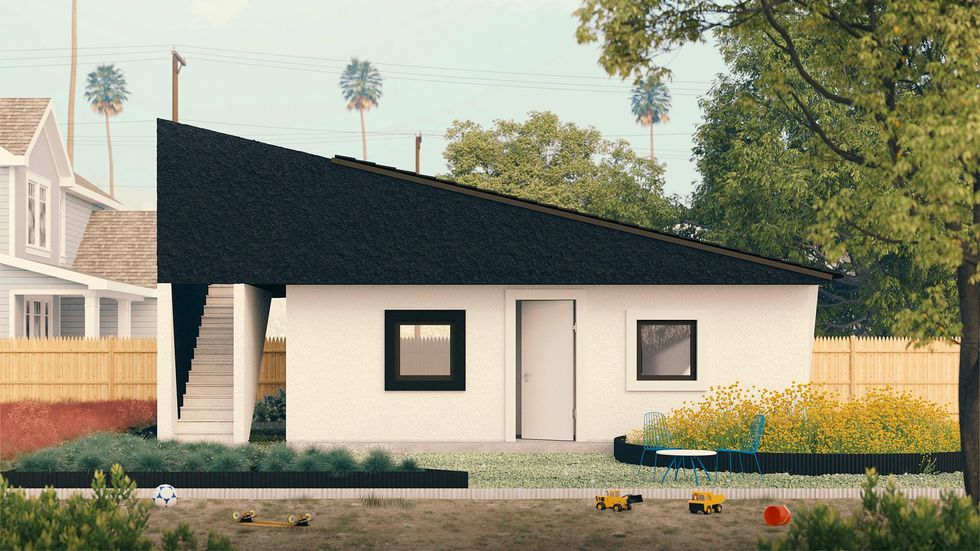
Massachusetts-based Jennifer Bonner/MALL designed a "Lean-to ADU" project, reinterpreting the stucco box and exaggerated false front, both Los Angeles architectural mainstays.
The design has been approved for a 525-square-foot one-story, one-bedroom unit with a 125-square-foot roof deck.
sekou cooke STUDIO
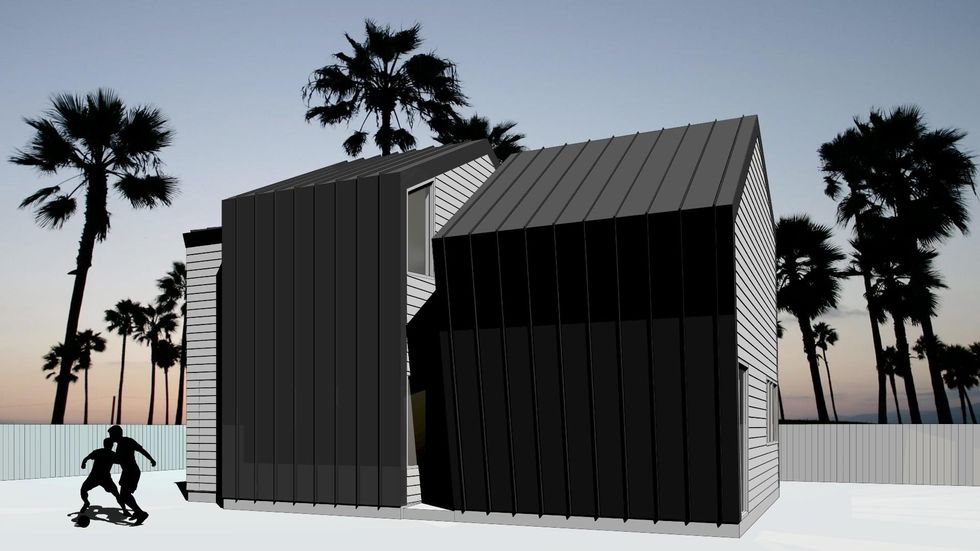
New York-based sekou cooke STUDIO is the sole Black-owned architectural firm on the project.
"The twisted forms of this ADU recalls the spin and scratch of a DJ's records" from the early 90s, the firm said.
Its design, still pending approval, is for a 1,200-square-foot, two bedroom and two bathroom can be adapted to a smaller one-bedroom unit or to include an additional half bath.
SO-IL

New York-based SO-IL was founded in 2008. It has completed projects in Leon, Seoul, Lisbon and Brooklyn.
Its one-story, one-bedroom 693-square-foot unit is pending approval. It is estimated the construction cost will be between $200,000 and $250,000.
WELCOME PROJECTS

Los Angeles-based Welcome Projects has worked on projects ranging from buildings, houses and interiors to handbags, games and toys.
Its ADU is nicknamed The Breadbox "for its curved topped walls and slight resemblance to that vintage counter accessory."
It has been approved for a one-story, one-bedroom 560-square-foot unit.
wHY Architecture
Founded in 2004, wHY is based in Los Angeles and New York City. It has taken on a landmark affordable housing and historic renovation initiative in Watts.
Its one-story, one- or two-bedroom 480 to 800-square-foot unit is pending approval.
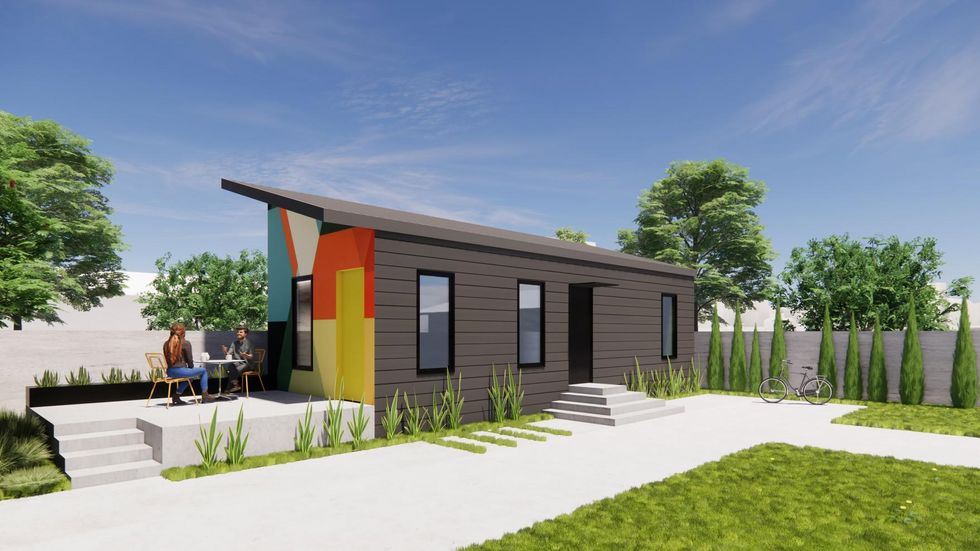
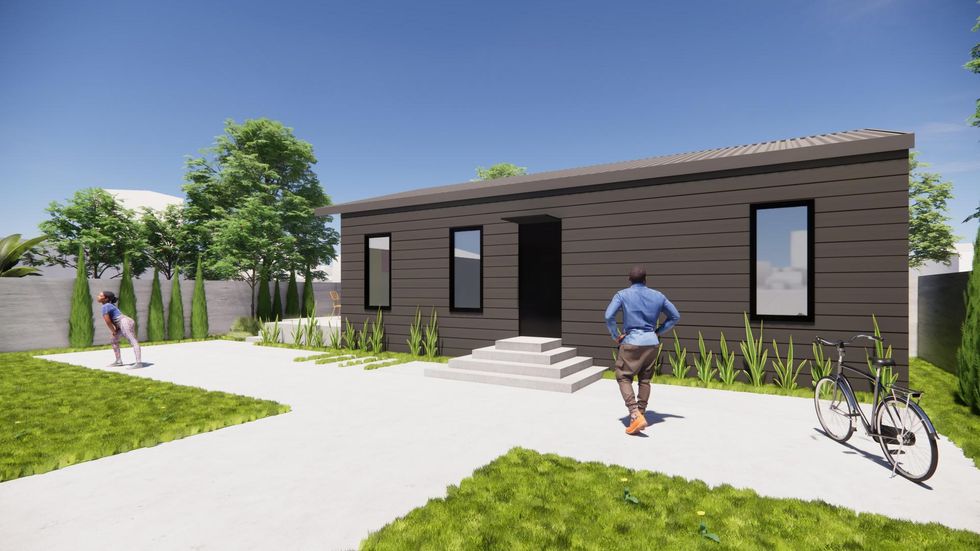
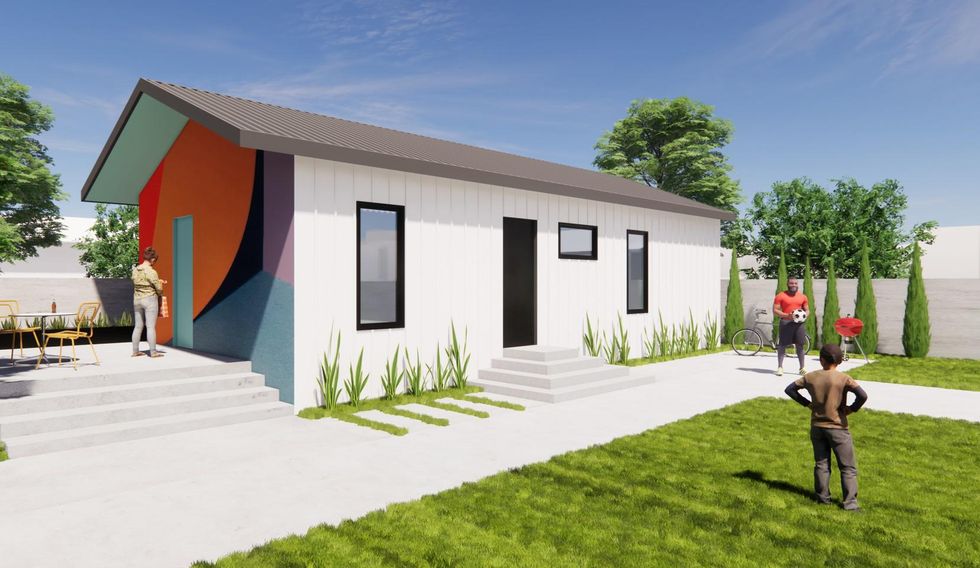
Firms that want to participate in the program can learn more here . Angelenos interested in building a standard ADU plan can learn more the approved projects here.
From Your Site Articles
- United Dwelling Raises $10M to Address the Housing Shortage ... ›
- Plant Prefab Raises An Additional $30 Million - dot.LA ›
- How 3D Printing Could Help Tackle Homelessness in LA - dot.LA ›
- New Bills, New Startups Address Housing in California - dot.LA ›
- LA's ADU Culture Still Faces Financial Barriers - dot.LA ›
- What Will Take To Make Modular Homes Mainstream? - dot.LA ›
Related Articles Around the Web
Sarah Favot
Favot is an award-winning journalist and adjunct instructor at USC's Annenberg School for Communication and Journalism. She previously was an investigative and data reporter at national education news site The 74 and local news site LA School Report. She's also worked at the Los Angeles Daily News. She was a Livingston Award finalist in 2011 and holds a Master's degree in journalism from Boston University and BA from the University of Windsor in Ontario, Canada.
The Streaming Era Just Ate the Studio Era
10:45 AM | December 06, 2025
🔦 Spotlight
Hello Los Angeles!
In a week where everyone was already arguing about what “the future of entertainment” is supposed to look like, Netflix decided to skip the debate and buy a giant piece of the past and, possibly, the future. Netflix announced a definitive agreement to acquire Warner Bros. Discovery’s Studios and Streaming business, including Warner Bros. film and television studios plus HBO and HBO Max. This is not just another media merger. It is a power transfer, from the studio era where the gatekeepers were greenlight committees to the platform era where the gatekeepers are subscriber relationships, home screens, and retention math.
Here are the bones of the deal. WBD shareholders would receive $27.75 per share, made up of $23.25 in cash and $4.50 in Netflix stock, with the stock portion subject to a symmetrical collar. Netflix puts the transaction at roughly $72 billion in equity value and $82.7 billion in enterprise value, and expects it to close in 12 to 18 months, but only after WBD completes its planned separation of its Global Networks business into Discovery Global, now expected in Q3 2026.
Now zoom in on why this matters in Los Angeles specifically.
LA’s creative engine is about to be run by a single, very efficient distribution machine
Warner Bros. is not just a studio. It is an institutional muscle memory for how to develop, package, and produce at scale, plus a library and franchises that can carry a business through multiple economic cycles. Netflix is not just a distributor. It is the largest direct to consumer entertainment subscription platform on earth, built around global reach, product iteration, and data feedback loops. Put them together and you get a company that can create, market, distribute, and monetize premium entertainment without needing anyone else’s permission.
That will sound exciting to some creators and terrifying to others, often for the same reason. When the same entity owns the audience relationship and the content factory, it can take bigger swings because it has more margin for error. It can also take fewer swings because it does not need to. The incentive shifts from “What is culturally important?” to “What makes people stay?” Those are sometimes the same question. Sometimes they are not.
This deal won’t be decided in a writers’ room. It’ll be decided by regulators.
This is exactly the type of consolidation regulators have been itching to interrogate. A combined Netflix plus HBO Max instantly raises questions about market power, competition, and pricing, plus downstream effects on theaters, independent studios, and negotiating leverage with talent. Even if Netflix vows to maintain current operations and keep the consumer experience strong, the political story is straightforward: fewer giant buyers typically means less bargaining power for everyone who sells into the system.
Also worth noting, Reuters reports a termination fee of $5.8 billion under certain circumstances, which tells you both sides are bracing for a drawn out, high scrutiny process.
The quiet subtext: the bundle is coming back, just wearing a streaming hoodie
Netflix will almost certainly pitch this as more choice and better value. Regulators will hear less competition. Consumers will hear how much is this going to cost me. The most plausible end state is not a single mega app on day one. It is a reimagined bundle: separate brands, packaged pricing, shared sign on, cross promotion, and eventually tighter integration if the politics and churn math allow it.
The real disruption is not whether HBO Max keeps its name. It is whether Netflix becomes the default front door to premium scripted entertainment globally.
🤝 Venture Deals
LA Companies
- Castelion, a Torrance based defense technology startup, raised a $350M Series B round led by Altimeter Capital and Lightspeed Venture Partners, with participation from investors including Andreessen Horowitz, General Catalyst, Lavrock Ventures, Space VC, Avenir and Interlagos Capital. The money will be used to scale production of its Blackbeard hypersonic weapon, stand up its Project Ranger manufacturing campus in New Mexico, and support multiservice testing and integration with U.S. Army and Navy platforms starting in 2026. - learn more
- Antares announced a $96M Series B to accelerate an iterative “build, test, iterate” approach to developing nuclear reactors quickly, with the funding going toward hardware and subsystem testing, fuel fabrication, manufacturing, and the infrastructure to turn on a reactor. The company says it plans a low-power “Mark-0” reactor demonstration in 2026 at Idaho National Laboratory, with a pathway to a full-power electricity-producing reactor as early as 2027 and a commercial prototype microreactor (“Mark-1”) after the Mark-0 milestone. - learn more
LA Venture Funds
- With FirstLook Partners participating, Flex raised a $60M Series B led by Portage, bringing its total equity raised to $105M to build an AI native finance platform for middle market business owners. The company says it will use the new funding to accelerate product expansion and scale its AI agent infrastructure across areas like private credit, business finance, personal finance, payments, and ERP. - learn more
- Led by MTech Capital, Curvestone AI raised a $4M seed round with participation from Boost Capital Partners, D2 Fund, and Portfolio Ventures to scale its AI automation platform for regulated industries like financial services, legal, and insurance. The company says it’s tackling the “compound error” problem that makes multi step AI workflows unreliable, and will use the funding to accelerate product development and go to market expansion. - learn more
- Co-led by CIV, Unlimited Industries raised a $12M seed round (alongside Andreessen Horowitz) to scale its “AI-native construction” approach to designing and building major infrastructure projects. The company says its platform can generate and evaluate massive numbers of design configurations to optimize for cost, safety, and performance, cutting pre-construction engineering timelines from months to weeks, and it is initially focusing on projects that rapidly expand U.S. power capacity for things like data centers, critical minerals, and advanced manufacturing. - learn more
- With Hyperion Capital participating (alongside Amplify Venture Partners, Spark Capital, Tamarack Global and others), Antithesis raised a $105M Series A led by Jane Street, which is both an investor and an existing customer. The company says it will use the capital to accelerate its deterministic simulation testing platform and scale go to market efforts across North America, Europe, and Asia, positioning the product as “critical infrastructure” for teams running complex distributed systems. - learn more
- With XO Ventures participating, Orq.ai raised an oversubscribed €5M seed round led by seed + speed Ventures and Galion.exe to help enterprises build, deploy, and manage production grade AI agents with stronger control over data, behavior, and compliance. The company says the funding will accelerate expansion of its platform, including its newly launched Agent Studio and managed runtime, as it pushes to close the “AI production gap” for companies moving beyond demos into real deployment. - learn more
- Untapped Ventures participated in Lemurian Labs’ oversubscribed $28M Series A, co-led by Pebblebed Ventures and Hexagon, as the company builds a software-first platform designed to run AI workloads efficiently across any hardware and across edge, cloud, and on-prem environments. Lemurian says the funding will help it expand engineering, accelerate product development, and deepen ecosystem collaborations aimed at reducing vendor lock in and infrastructure costs. - learn more
- Fifth Wall and Park Rangers Capital participated in Ridley’s $6.4M seed round, which Fifth Wall led, backing the company’s push to rebuild the real estate process around consumers with fewer commission-heavy frictions. Ridley says the capital will help launch an AI-powered buy-side experience that surfaces private, for-sale, and “soon-to-be-listed” homes using predictive analytics, while also expanding its commission-free seller tools and “Preferred Agents” network for on-demand support. - learn more
- Anthos Capital participated in Kalshi’s $1B Series E at an $11B valuation, a round led by Paradigm with other backers including Sequoia, Andreessen Horowitz, Meritech, IVP, ARK Invest, CapitalG, and Y Combinator. Kalshi says its trading volume now exceeds $1B per week across 3,500+ markets, and it will use the new capital to accelerate consumer adoption, integrate more brokerages, strike news partnerships, and expand product offerings. - learn more
Read moreShow less
Disney Picks AI, Paramount Picks a Fight
10:30 AM | December 12, 2025
🔦 Spotlight
Happy Friday, Los Angeles.
If last week felt like Netflix bought the script for Hollywood’s future, this week Disney and Paramount walked in with rewrites. One is handing its most valuable characters to an AI model. The other is trying to yank Warner Bros. away from Netflix with an all cash offer. Underneath both headlines is the same fight over who really owns the audience.
Disney, OpenAI and the AI powered vault
The Walt Disney Company struck a multiyear agreement with OpenAI that turns Sora into a kind of licensed imagination engine for more than 200 characters across Disney, Marvel, Pixar and Star Wars. Fans will be able to generate short, Sora made videos and images featuring Mickey, Moana, Darth Vader and others, with Disney curating select clips onto Disney Plus, while ChatGPT also rolls out inside the company.
For a studio that has spent years guarding its IP with lawyers, this is a big tone shift. Disney is telling the next generation of fans that playing with the characters happens through an AI model, not just a camera or sketchbook. That could create new formats and jobs, but it also blurs the line between human made and machine made work and puts fresh pressure on ongoing union conversations about training data, credits and compensation.
Paramount crashes the Netflix and Warner Bros. story arc
On the deal side, Warner Bros. Discovery is suddenly the lead in a love triangle. After Netflix announced plans to buy WBD’s studios and streaming business for a mix of cash and stock, Paramount Skydance came in with a hostile, all cash tender offer at 30 dollars per share for the entire company, including linear networks like CNN, TNT Sports and Discovery.
So WBD investors are looking at two very different futures. A Netflix deal would bolt Warner’s IP and production engine onto the world’s largest streaming platform and strip away cable. A Paramount deal would fuse two legacy Hollywood houses and keep more of the old bundle intact. For creators and crews in LA, both paths point to the same reality: fewer, bigger buyers with more control over what gets made, how it is distributed and who gets paid.
Taken together, Disney’s OpenAI partnership and the escalating fight over Warner Bros. are not just AI news or M&A news. They are signals that the next version of Hollywood will be built by a tight circle of platforms that own the IP, the channels and now the models that sit between creators and audiences.
Now keep scrolling for this week’s LA venture deals, fund announcements and acquisitions.
🤝 Venture Deals
LA Companies
- K2 Space, a Torrance-based startup building large, high-power satellite platforms, raised a $250M Series C at a $3B valuation in a round led by Redpoint with participation from T. Rowe Price–advised accounts, Hedosophia, Altimeter, Lightspeed and Alpine Space Ventures. The company says the funding will accelerate deployment of its next generation “heavy-lift era” spacecraft, built to deliver far more power and capability than typical smallsats and to support missions across LEO, MEO and GEO for commercial and U.S. government customers, where it already has over $500M in signed contracts. - learn more
- Stic raised a $10M bridge round led by Accretion Capital, bringing the Los Angeles based out of home adtech startup’s valuation to $200M. The company, which turns everyday drivers into mobile ad inventory for brands, plans to use the funding to expand across more than 30 U.S. states and Canada, deepen relationships with national advertisers and agencies, and strengthen its operations in new markets. - learn more
- Machina Labs secured a strategic investment and initial partnership agreement from Abu Dhabi’s Strategic Development Fund, the investment arm of EDGE Group, as part of a plan to deploy its AI driven robotic manufacturing technology in the UAE. The deal includes an initial capital infusion with potential funding of up to AED 125 million as the parties explore a joint venture to produce advanced metal structures for sectors like aerospace, defense, and mobility. Machina Labs’ software defined RoboCraftsman platform will anchor the collaboration, enabling rapid, flexible production of complex metal components closer to regional demand. - learn more
- AnySignal raised a $24M Series A led by Upfront Ventures, with participation from Also Capital, BlueYard Capital, Balerion Space Ventures, First In Ventures and other strategic backers. The Los Angeles based company plans to use the funding to scale production of its space communications and RF systems, expand its national security product lines, and build a new LA area facility that brings everything from algorithm design to high rate manufacturing under one roof. - learn more
- Saviynt raised a $700M Series B growth round at an approximately $3B valuation, in a financing led by KKR with participation from Sixth Street Growth, Ten Eleven, and existing backer Carrick Capital Partners. The Los Angeles based identity security company says it will use the capital to accelerate product development and integrations as enterprises lean on its AI powered platform to govern human, machine, and AI agent identities across applications, data, and infrastructure. - learn more
- Haven Energy raised $40M in new funding to accelerate its push into distributed residential power, combining an equity round led by Giant Ventures with a debt facility from Turtle Hill and additional backing from investors including the California Infrastructure Bank, Carnrite Ventures, Chaac Ventures, Comcast Ventures, and Lerer Hippeau. The Los Angeles based company plans to use the capital to deepen partnerships with utilities and community choice aggregators, expand its solar plus battery leasing model and Channel Partner Program for local installers, and scale one of the nation’s largest residential virtual power plant networks, building on more than 10 MW installed and over 50 MW in development for 2026. - learn more
- Diald AI raised $3.75M in funding to expand its AI powered real estate due diligence and underwriting platform for investors and lenders. The company says it will use the capital to deepen its data coverage, enhance underwriting automation, and grow its customer base of institutional and private real estate investors looking to analyze deals faster and with more consistency across markets. - learn more
- Hot Smart Rich, Maggie Sellers Reum’s fast growing “female ambition” media brand, has secured a seven figure strategic investment from Steven Bartlett’s media and investment company FlightStory. The partnership aims to turn HSR into a transatlantic platform that connects culture, content, capital, and community, with ambitions to 10x revenue and headcount across production, marketing, product, ecommerce, and membership. In under a year, Hot Smart Rich has already built a cult following with around 1.8M downloads and roughly 500,000 audience members by blending money and business talk with an intimate, group chat tone. - learn more
LA Venture Funds
- Mucker Capital backed Orion Sleep’s $18M seed round, joining investors including Browder Capital and Second Sight to support the launch of the company’s AI powered Smart Cover. The startup’s mattress cover fits over any standard bed, uses built in sensors to track heart rate, breathing and sleep stages, and automatically heats or cools each side of the bed to optimize deep and REM sleep. Orion says the funding will help scale production and commercialization of its system, which starts at $2,295 and is designed as a more accessible alternative to fully replacing a mattress. - learn more
- B Capital led Fervo Energy’s oversubscribed $462M Series E, backing the Houston based company’s push to make next generation geothermal a core source of always on, carbon free power. Fervo says the round will accelerate buildout of its flagship Cape Station project in Utah, expected to reach 500 MW by 2028, and support early development of additional plants as rising AI and electrification demand strain the grid. - learn more
- Trousdale Ventures joined Vatn Systems’ $60M Series A, a round led by BVVC that the Rhode Island based defense tech company says is one of the largest financings in the autonomous underwater vehicle space. Vatn plans to use the capital to expand its team, accelerate R&D, and scale manufacturing of its Skelmir AUV platforms and INStinct navigation system as it deepens work with the U.S. Navy and Marine Corps and grows its international customer base. - learn more
- Morpheus Ventures participated in Nu Quantum’s $60M Series A, an oversubscribed round led by National Grid Partners with Gresham House Ventures also joining to back the company’s distributed quantum networking platform. Nu Quantum says it will use the capital to accelerate its “Entanglement Fabric” roadmap, scale its team, and expand globally as it connects multiple quantum processors into a modular, fault tolerant “quantum datacenter” architecture. - learn more
- Morpheus Ventures joined Fresco’s €15M Series C round, backing the company’s push to power AI driven cooking experiences across a growing network of connected kitchen appliances. The round, which also included new and existing investors like Middleby, ACT Venture Capital, AE Ventures and Alsop Louie Partners, will help Fresco scale its AI Cooking Companion and KitchenOS platform globally, integrate more OEM partners, and deliver personalized, cross brand cooking guidance to home cooks. - learn more
- Rainfall Ventures participated in Zed’s $16.5M Series A, a round led by Accel that brings the company’s total funding to $22.5M. The husband and wife founded fintech, is building a digital bank for young professionals across Asia, and plans to use the new capital to expand its APAC footprint, grow its team in San Francisco and Manila, and deepen its AI driven underwriting and credit products for this demographic. - learn more
- GroundForce Capital invested in RTZN Brands, the company behind Righteous Felon, to help scale its cleaner, craft-first jerky and meat snack portfolio. The funding follows a year of triple digit sales growth and expanding national distribution, and will support broader retail rollout, deeper club and grocery partnerships, and new high protein, clean ingredient products as Righteous Felon pushes to become a defining brand in the better for you meat snack category. - learn more
- Amplify.la participated in Pryzm’s $12.2M seed round, which was led by Andreessen Horowitz’s American Dynamism fund with additional backing from XYZ Venture Capital and Forum Ventures. Pryzm is building an AI powered operating system for federal procurement that helps government agencies discover, evaluate, and acquire emerging technology faster, while giving contractors a unified view of opportunities and capture workflows. The company plans to use the funding to scale its platform across more defense and civilian agencies and grow its team in key hubs like Washington, D.C., Boston, and New York. - learn more
- Saban Ventures joined Lin Health’s $11M oversubscribed Series A, backing the company’s virtual, neuroscience based chronic pain recovery platform alongside lead investor Proofpoint Capital and other new and existing backers. Lin Health plans to use the funding to advance product innovation, strengthen partnerships with major health systems and payers, and expand nationwide access to its non opioid, physician led and coach supported programs for conditions like migraines, IBS, and back and joint pain. - learn more
LA Exits
- tvScientific is being acquired by Pinterest, which has entered into a definitive agreement to buy the connected TV performance advertising platform as it pushes deeper into CTV. Pinterest plans to integrate tvScientific’s outcome based CTV buying, automation and attribution tools into its Performance+ and other AI powered ad products, giving advertisers a clearer view of how connected TV contributes to performance campaigns. The deal, which is subject to regulatory review and expected to close in the first half of 2026, will see tvScientific continue operating under its own brand while tapping Pinterest’s intent rich audience data across 600 million monthly users. - learn more
- VuePlanner has been acquired by Cadent, which is folding the YouTube ad planning and measurement startup into its predictive advertising platform to strengthen what it calls a “Total Video” strategy across linear TV, CTV, and YouTube. The deal gives Cadent’s clients access to VuePlanner’s AI and expert curated tools for contextual targeting, quality scoring, and independent measurement on YouTube, so advertisers can plan and activate campaigns across premium creator content and traditional TV from a single, end to end workflow. - learn more
- Cinapse is being acquired by Wrapbook and will join the film and TV payroll and production accounting platform to create a more “connected back office” that links scheduling, payroll, and accounts payable in one system. The deal brings Cinapse’s modern, cloud based scheduling tools and track record across more than $6 billion in productions into Wrapbook’s financial infrastructure, with the goal of giving producers, ADs, and studios a unified way to plan shoots and track every dollar from schedule to spend. - learn more
Read moreShow less
RELATEDTRENDING
LA TECH JOBS


